MetaHash
Cryptocurrency and dApp Platform
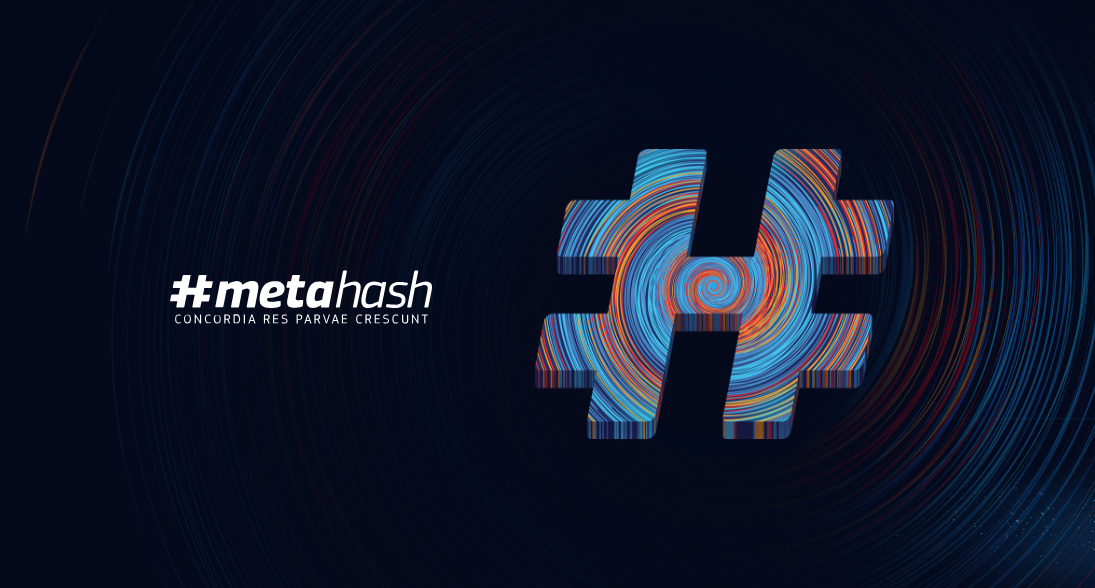
#MetaHash is a network for sharing digital assets and a dapp platform, claiming the following features:
- validation rate under 3 seconds
- 50000 tps
- 5 different consensus algorithms
- decentralized
- supports erc20 tokens
There are 4 components of the system.
- TraceChain: the blockchain
- #MetaApps: Decentralized applications
- #MetaGate: Wallet + dApp directory
- #MetaHashCoin: the coin
Token metrics
Market opportunity/Competitive analysis
There are countless other projects competing in dapp platform space. However, Ethereum is still the biggest and has the network effects.
#MetaHash block anchors in Bitcoin and Ethereum networks
I don’t see many other projects offering this.
Team/Advisors/Partnerships
#MetaHash is an open-team structured project, which welcomes all people and companies.
More than 150 members already joined #MetaHash
https://metahash.org/#teambanner
- Gleb Nikitin, (Cofounder & CRO)
- Founder of AdSniper
- Previously CEO of Dozory
- Economics at Univ. of Mannheim ‘01
- Oleg Romanenko, (CSA & Server side developer)
- System Architect/ Server side developer at AdSniper
- Previously senior System Analyst at Alfa-Bank
- MS CS at Volgograd State Technical University ‘08
- Mikhail Zarutskiy, (CTO)
- CTO at AdSniper
- Volgograd State Technical University ‘13
- Sergey Raylyan, (CIO)
- COO & Project Manager at AdSniper
- MEng. and Tech at Volgograd State Technical University ‘08
-
and 29 other employees at AdSniper
- Vladimir Bashkin, (CMO)
- CEO and New Business Director of AdNow
- Advisor of Token.Ad
- Management in the field of Internet technologies at RMA Business School ‘10
-
and 92 other employees at AdNow
- Anton Agranovsky, (Cofounder & CBDO)
- Founder & President of Agranovsky IT
- Previously Founder & CEO of Destiny Development
- International Management at Institute of Economics and Culture ‘09
- Gennady Yakunin, ()
- CEO of Agranovsky IT
- experience in gaming projects
- Svetlana Rudenok, ()
- Deputy CEO of Agranovsky IT
- experience in gaming projects
- Andrey Korostelev, ()
- CFO of Agranovsky IT
- experience in financial management of IT and gaming projects
- and 11 other employees at Agranovsky IT
Competitive Advantage
#MetaHash has several teams, a total of 150 people, working on this project.
Tokenomics and Token Utility
Forging
- 50% of all #MetaHashCoins will be distributed over 10 years by forging. That is exactly 4,600,000,000 #MHC.
- 708,400,000 #MHC (or 15.4% of the total forging pool of all time, or 7.7% of the #MHC total number) will be distributed among the forging participants within the first year after the start. The fewer coins are used in forging, the higher rewards for the participants.
- 70,840,000 #MHC (or 10% of the reward from the forging pool) will go to those who have #MetaGate active and at least 100 #MHC in their wallet. If you don’t have much money, the best way for you to earn #MHC is to use #MetaGate every day (by launching it on your computer).
- 637,560,000 #MHC (or 90% of the reward from the forging pool) will go to those who have 100,000 #MHC and more in their wallets.
Other
CPU time, data storage, data transmission.
Code
#MetaHash has 2 github accounts, 1 public and 1 private.
Private account:
Unfortunately, I’m unable to share any insights from the repo metadata since it looks like there is no git history.
With that said, there is a substantial amount of well-organized code, all in C++.
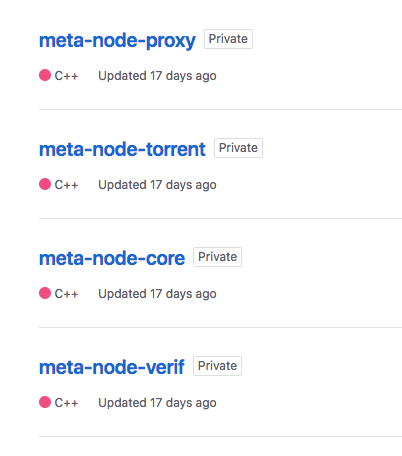
The private account has 4 repos. You may notice that the names of all the repos except meta-node-proxy correspond with node types in the network.
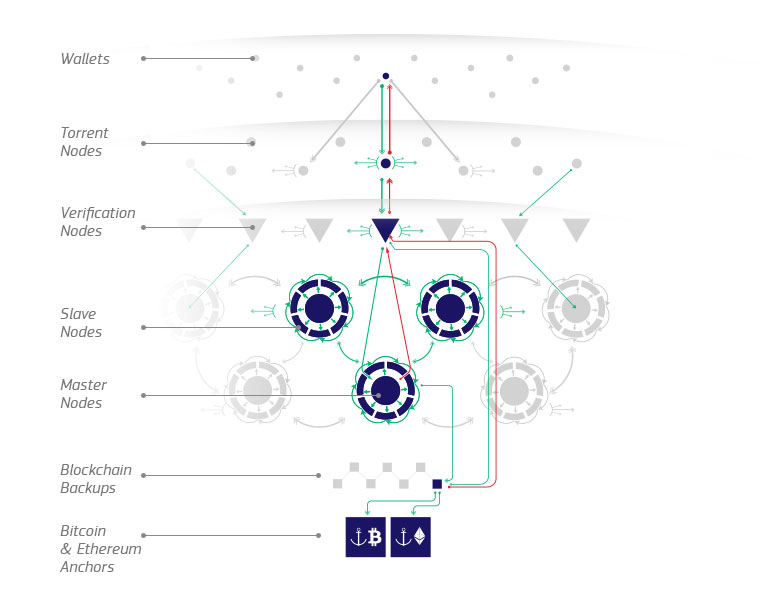
meta-node-proxy (446 lines): an http server that validates and queues transactions for the verification nodes, and logs metrics.
meta-node-torrent (28 C++ files, 6904 lines): Saves blockchain to leveldb. Torrent nodes transmit data between the wallet and other nodes.
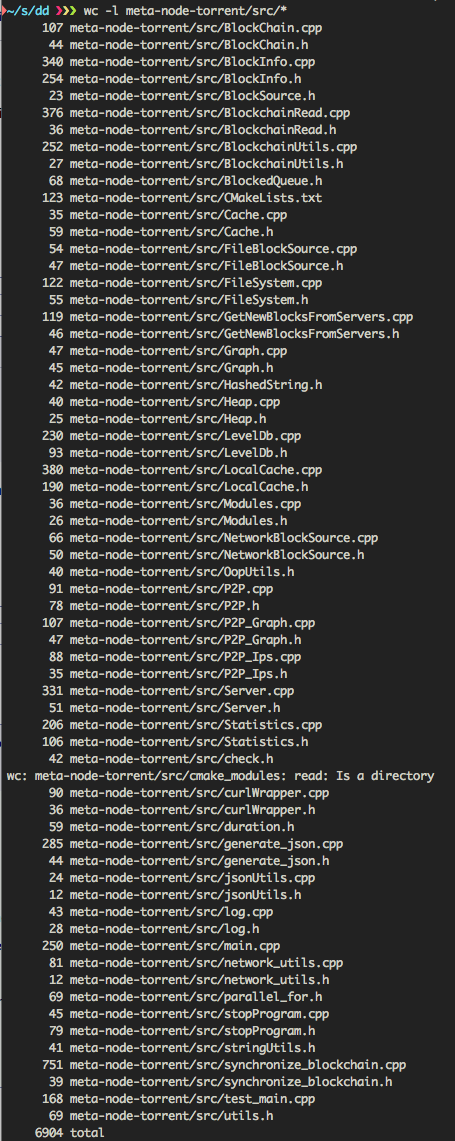
(list of meta-node-torrent source files with line counts for each file)
Starting at main.cpp: It reads the config file, sets up statistics reporting, starts a LevelDB instance, and starts synchronizing everything. Finally, it starts the server thread:

I wasn’t able to find the Sniper library that this uses, as shown in Server.h,
```cpp
#include <sniper/mhd/MHD.h>
# ...
class Server: public sniper::mhd::MHD {
# ...
}
```
but there is still a good amount of info we can gather from Server.cpp. It implements the following functions callable through http (defined below the code in this screenshot but private for now):

Other files of note in this repo include P2P* (handling the peer to peer communication and pushing transactions to a queue) and synchronize_blockchain.cpp (reading from the tx queue and synchronizing with a local LevelDb cache and cdn). These 2 files form what #MetaHash calls #MetaSync.
#MetaSync data synchronization subsystem allows complete and integral data updating around the world in under 3 seconds
meta-node-verif (1 C++ file, 305 lines):
main.cpp runs an http server that reads and process transactions.
meta-node-core (4 C++ files, 1526 lines):
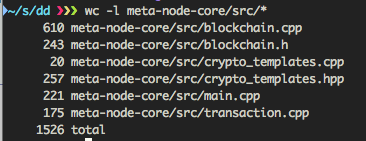
Public repo:
https://github.com/metahashorg
#Metagate: #MetaHash wallet code
476 commits. There is a lot of code here but wallet/client code isn’t as interesting or critical as node code. This repo was started on May 20, 2018 but the first commit shows there was work from before existing git history. Git history shows that the team is making active progress in this repo.
Conclusion
The blockchain has substantial code behind it, all written from scratch (not a fork of anything else). #MetaApps are not ready yet as far as I can tell, and the way it’s explained it seems more like a decentralized cloud than a smart contract platform.
One of the biggest differentiating factors #MetaHash claims is that it is faster and more decentralized, while still maintaining security. I would love to see if #MetaHash published a test set-up and report to prove these numbers, because otherwise this is a very difficult space to compete in.
#MetaHash says that it uses block anchors in the Bitcoin and Ethereum networks to increase security; however, I was not able to find the implementation in code.
Another differentiating factor is #MetaApps, which #MetaHash claims can run with using any programming language. To me, it sounds like it plays a different role than smart contracts, but the team uses them interchangably. Due to this, I’m not sure if #MetaHash should be categorized as a dapp platform as opposed to a decentralized cloud platform.
Other Info
« Metadium
Sovrin »